|
|
|
Sort Order |
|
|
|
Items / Page
|
|
|
|
|
|
|
| Srl | Item |
| 1 |
ID:
139581
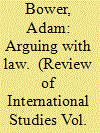

|
|
|
|
|
| Summary/Abstract |
Recent studies have highlighted the instrumental use of language, wherein actors deploy claims to strategically pursue policy goals in the absence of persuasion or socialisation. Yet these accounts are insufficiently attentive to the social context in which an audience assesses and responds to strategic appeals. I present a theoretical account that highlights the distinctly powerful role of international law in framing strategic argumentation. Legalised discourses are especially legitimate because law is premised on a set of internally coherent practices that constitute actors and forms of action. I then illustrate the implications in a hard case concerning US efforts to secure immunities from International Criminal Court jurisdiction. Contrary to realist accounts of law as a tool of the powerful, I show that both pro- and anti-ICC diplomacy was channelled through a legal lens that imposed substantial constraints on the pursuit of policy objectives. Court proponents responded to US diplomatic pressure with their own legal arguments; this narrowed the scope of the exemptions, even as the Security Council temporarily conceded to US demands. While the US sought to marry coercion with argumentative appeals, it failed to generate a lasting change in global practice concerning ICC jurisdiction.
|
|
|
|
|
|
|
|
|
|
|
|
|
|
|
|
| 2 |
ID:
139583


|
|
|
|
|
| Summary/Abstract |
This article challenges conventional narratives that suggest that the travails in the Doha Round, the shift to bilateral free trade agreements, and the broader unfolding of the global crisis collectively presage the decline of either the WTO or the broader institution of multilateral trade. We question the extent to which recent trends can indeed be said to constitute a genuine crisis of trade multilateralism by reflecting upon the contradictory and ambiguous nature of the multilateralism of the past, and also upon how contemporary multilateralism has been framed with reference to it. Our main finding is that, in contrast to the many short and medium-term symptoms which tend to appear in the conventional story of multilateral decline, there is actually a far more worrying long-term trend which underpins the varied conflicts that characterise contemporary trade politics: the fundamental lack of a shared social purpose between the developed countries and the more powerful emerging countries on which a stable, equitable, and legitimate edifice of multilateral trade rules can be erected, institutionalised, and enhanced.
|
|
|
|
|
|
|
|
|
|
|
|
|
|
|
|
| 3 |
ID:
139582
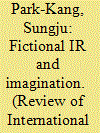

|
|
|
|
|
| Summary/Abstract |
In the field of International Relations (IR), narrative approaches and an alternative way of writing seem to have gained growing attention in recent scholarship. Autoethnography and autobiography can be taken as primary examples. The article aims to advance this growing scholarship by proposing the concept of fictional IR. The idea is concerned with how to use the imagination in IR. I suggest that fiction writing can become a method for dealing with lack of information and contingency surrounding it. Fictional IR is more than reading and using fiction as a reference source or vehicle for analysis. It can incorporate the employment of fiction writing in IR scholarship. One of the benefits could be to articulate sensitive and complicated problems in a more flexible and imaginative way, making the most of the power of story and imagination. It should be stressed that the focal point is to write fiction; it is not to write about fiction. To support this suggestion, the article offers a short fictional-factual story. By using imagination, creating characters, combining data with fictional narrative, or with one's own experience, I believe that more original and empathetic IR writing is possible.
|
|
|
|
|
|
|
|
|
|
|
|
|
|
|
|
| 4 |
ID:
139578
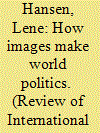

|
|
|
|
|
| Summary/Abstract |
This article introduces international icons to the field of International Relations. International icons are freestanding images that are widely circulated, recognised, and emotionally responded to. International icons come in the form of foreign policy icons familiar to a specific domestic audience, regional icons, and global icons. Icons do not speak foreign policy in and of themselves rather their meaning is constituted in discourse. Images rise to the status of international icons in part through images that appropriate the icon itself, either in full or through inserting parts of the icon into new images. Appropriations might be used and read as critical interventions into foreign policy debates, but such readings should themselves be subjected to analysis. A three-tier analytical and methodological framework for studying international icons is presented and applied in a case study of the hooded prisoner widely claimed to be emblematic of the Abu Ghraib prison scandal.
|
|
|
|
|
|
|
|
|
|
|
|
|
|
|
|
| 5 |
ID:
139577
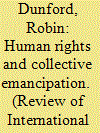

|
|
|
|
|
| Summary/Abstract |
This article develops contextually grounded accounts of emancipation in general and notions of collective rights based emancipation in particular by identifying a form of emancipatory politics in which collectives demand rights for themselves. The article develops the idea of collective, rights based emancipation by focusing on the practices of two related social movements, the Landless Workers Movement (MST) and la Via Campesina. The MST and Via Campesina seek to replace existing rights to ‘food security’ with a human right to ‘food sovereignty’. While food security agendas emphasise the role of international governance agencies in providing food on behalf of others, food sovereignty is secured by peasant social movements themselves. Furthermore, practices of active citizenship and democratic organisational structures, built through the grassroots and transnational struggles through which peasants raise their demand for human rights, are vital in enacting rights to food sovereignty. In instances where victims are not entirely silenced and powerless, this combination of a demand for human rights and the development of practices of citizenship that enable people to demand and secure rights for themselves provides a contextually grounded emancipatory alternative to interventionist politics that, however well intentioned, risk reinforcing the dependence of purportedly powerless victims.
|
|
|
|
|
|
|
|
|
|
|
|
|
|
|
|
| 6 |
ID:
139576
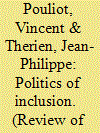

|
|
|
|
|
| Summary/Abstract |
The debate on the reform of the Security Council can be conceptualised as the most recent episode in the evolution of World Governing Councils (WGCs), that is, the highest-level intergovernmental bodies charged with regulating the international use of violence. Building on a historical comparison of key formative and transformative moments – 1815, 1919, 1945, and post-Cold War – we argue that the modern evolution of WGCs is characterised by increasing inclusiveness. More specifically, we show that the number of participants involved in deliberations has constantly risen; that legitimating principles have gradually tilted in favour of ‘input legitimacy’; that the constitutive rules and procedures have steadily gained in transparency; and that the WGCs themselves have comprised an expanding membership with a decreasing number of veto points. At the theoretical level, these converging trends can be explained by the existence of a ‘ratchet effect’ whereby new norms and practices of inclusion accumulate over time. However concrete and long lasting, the democratic gains registered in the process must be cast in terms of historically specific politics and struggles rather than in terms of lofty ideals promoted by altruistic norm entrepreneurs.
|
|
|
|
|
|
|
|
|
|
|
|
|
|
|
|
| 7 |
ID:
139584


|
|
|
|
|
| Summary/Abstract |
Tackling germs, negotiating norms, and securing access to medicines are persistent challenges that disproportionally affect developing countries' participation in global health governance. Furthermore, over the last two decades, the excessive focus on global pandemics and security in global health diplomacy, rendered peripheral diseases that usually strike the poor and vulnerable, creating situations of marginalisation and inequality across societies. However, as the importance of regions and regionalism increases in global politics, and integration ambitions and initiatives extend beyond trade and investment to embrace welfare policy, there are new opportunities to explore whether and how regional commitments affect health equity and access to medicine in developing nations. What, if any, are the possibilities for meso-level institutions to provide leadership and direction in support of alternative practices of global (health) governance? Can regional polities become international advocacy actors in support of global justice goals? This article addresses these questions by analysing regional health diplomacy in South America. The article argues that regional organisations can become sites for collective action and pivotal actors in the advocacy of rights (to health) enabling diplomatic and strategic options to member state and nonstate actors, and playing a role as deal-broker in international organisations by engaging in new forms of regional health diplomacy.
|
|
|
|
|
|
|
|
|
|
|
|
|
|
|
|
| 8 |
ID:
139579
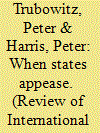

|
|
|
|
|
| Summary/Abstract |
When do states appease their foes? In this article, we argue that governments are most likely to favour appeasing a foreign threat when their top leaders are severely cross–pressured: when the demands for increased security conflict sharply with their domestic political priorities. We develop the deductive argument through a detailed analysis of British appeasement in the 1930s. We show that Neville Chamberlain grappled with a classic dilemma of statecraft: how to reduce the risk of German expansionism while facing acute partisan and electoral incentives to invest resources at home. For Chamberlain, appeasement was a means to reconcile the demands for increased security with what he and his co-partisans were trying to achieve domestically. We conclude by discussing implications of the analysis for theorising about appeasement and about how leaders make grand strategy more generally.
|
|
|
|
|
|
|
|
|
|
|
|
|
|
|
|
| 9 |
ID:
139580
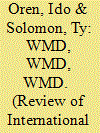

|
|
|
|
|
| Summary/Abstract |
We seek to reinvigorate and clarify the Copenhagen School's insight that ‘security’ is not ‘a sign that refers to something more real; the utterance [‘security’] itself is the act’. We conceptualise the utterances of securitising actors as consisting not in arguments so much as in repetitive spouting of ambiguous phrases (WMD, rogue states, ethnic cleansing). We further propose that audience acceptance consists not in persuasion so much as in joining the securitising actors in a ritualised chanting of the securitising phrase. Rather than being performed to, the audience participates in the performance in the manner in which a crowd at a rock concert sings along with the artists. We illustrate our argument with a discussion of how the ritualised chanting of the phrase ‘weapons of mass destruction’ during the run-up to the Iraq War ultimately produced the grave Iraqi threat that it purportedly described.
|
|
|
|
|
|
|
|
|
|
|
|
|
|
|
|
|
|
|
|
|